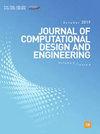用海洋捕食者算法提升 Aquila 优化器的组合优化能力
IF 4.8
2区 工程技术
Q1 COMPUTER SCIENCE, INTERDISCIPLINARY APPLICATIONS
引用次数: 0
摘要
本研究利用海洋捕食者算法(MPA)开发了一种名为 EHAOMPA 的 Aquila 优化器(AO)改进版。MPA 是一种最新的、性能良好的优化器,具有独特的内存节省和 FADs 机制。与此同时,它也存在各种缺陷,如全局搜索不足、收敛迟缓和局部最优停滞。而 AO 具有强大的全局探索能力、快速的收敛速度和较高的搜索效率。因此,所提出的 EHAOMPA 旨在补充 AO 和 MPA 的不足,同时带来新的特点。具体来说,在探索阶段加入了基于代表的狩猎技术,以增强种群多样性。同时,在开发阶段引入了基于随机对立的学习(ROBL),以防止优化器停留在局部最优状态。本研究测试了 EHAOMPA 在 23 个标准数学基准函数、CEC2017 测试套件中的 29 个复杂测试函数、6 个受限工业工程设计问题以及针对 COVID-19 CT 图像检测问题的 CNN 参数优化上的性能。EHAOMPA 与现有的四种优化算法进行了比较,在数值和实际问题上都取得了最佳性能。与其他方法相比,测试函数结果表明 EHAOMPA 具有更强的全局搜索能力、更高的收敛速度、更高的精度以及更强的避免局部最优的能力。在实际问题中取得的优异实验结果表明,所开发的 EHAOMPA 在解决实际优化问题方面具有巨大潜力。多种策略的结合可以有效提高算法的性能。EHAOMPA 的源代码可在 https://github.com/WangShuang92/EHAOMPA 公开获取。本文章由计算机程序翻译,如有差异,请以英文原文为准。
Boosting Aquila Optimizer by Marine Predators Algorithm for Combinatorial Optimization
In this study, an improved version of Aquila Optimizer (AO) known as EHAOMPA has been developed by using the Marine Predators Algorithm (MPA). MPA is a recent and well-behaved optimizer with a unique memory saving and FADs mechanism. At the same time, it suffers from various defects such as inadequate global search, sluggish convergence, and stagnation of local optima. However, AO has contented robust global exploration capability, fast convergence speed, and high search efficiency. Thus, the proposed EHAOMPA aims to complement the shortcomings of AO and MPA while bringing new features. Specifically, the representative-based hunting technique is incorporated into the exploration stage to enhance population diversity. At the same time, random opposition-based learning (ROBL) is introduced into the exploitation stage to prevent the optimizer from sticking to local optima. This study tests the performance of EHAOMPA's on twenty-three standard mathematical benchmark functions, 29 complex test functions from the CEC2017 test suite, six constrained industrial engineering design problems, and a CNN-hyperparameter optimization for COVID-19 CT-image detection problem. EHAOMPA is compared with four existing optimization algorithm types, achieving the best performance on both numerical and practical issues. Compared to other methods, the test function results demonstrate that EHAOMPA exhibits a more potent global search capability, a higher convergence rate, increased accuracy, and an improved ability to avoid local optima. The excellent experimental results in practical problems indicate that the developed EHAOMPA has great potential in solving real-world optimization problems. The combination of multiple strategies can effectively improve the performance of the algorithm. The source code of the EHAOMPA is publicly available at https://github.com/WangShuang92/EHAOMPA.
求助全文
通过发布文献求助,成功后即可免费获取论文全文。
去求助
来源期刊

Journal of Computational Design and Engineering
Computer Science-Human-Computer Interaction
CiteScore
7.70
自引率
20.40%
发文量
125
期刊介绍:
Journal of Computational Design and Engineering is an international journal that aims to provide academia and industry with a venue for rapid publication of research papers reporting innovative computational methods and applications to achieve a major breakthrough, practical improvements, and bold new research directions within a wide range of design and engineering:
• Theory and its progress in computational advancement for design and engineering
• Development of computational framework to support large scale design and engineering
• Interaction issues among human, designed artifacts, and systems
• Knowledge-intensive technologies for intelligent and sustainable systems
• Emerging technology and convergence of technology fields presented with convincing design examples
• Educational issues for academia, practitioners, and future generation
• Proposal on new research directions as well as survey and retrospectives on mature field.
 求助内容:
求助内容: 应助结果提醒方式:
应助结果提醒方式:


